This post may contain affiliate links. Please read our disclosure policy.
This mung bean sprouts recipe is ready in minutes! Inspired by Korean bean sprout salad, Sukju Namul, it’s a quick, garlicky, and refreshing side dish perfect for summer. Lightly blanched mung bean sprouts are tossed with scallions and sesame seeds in a savory Asian sauce.
You’ll learn how to choose fresh sprouts that stay crisp, plus how to make a balanced sauce that’s sweet, salty, and full of umami. No soggy or bland sprouts here! This dish is served cold—if you’re craving something warm, try my bean sprouts stir fry.
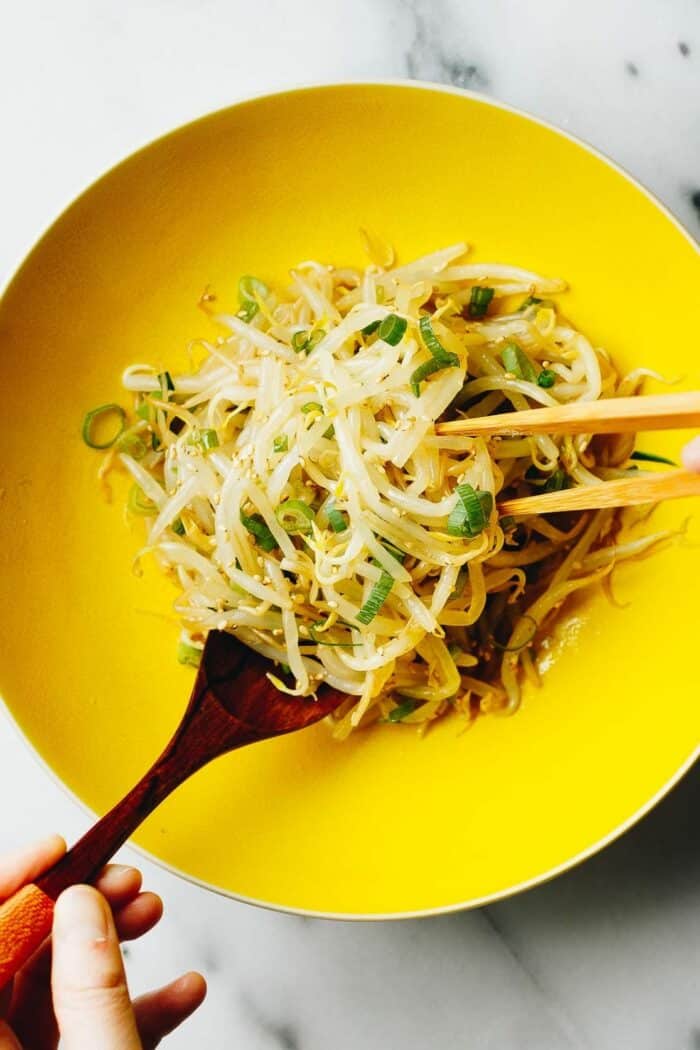
Table of Contents
Ingredient Notes
A crisp, refreshing mung bean sprout banchan starts with high-quality, fresh bean sprouts. After a quick blanch, they’re tossed with a garlicky Asian dressing that’s perfectly balanced—salty, slightly sweet, nutty, and full of umami.
Mung bean sprouts
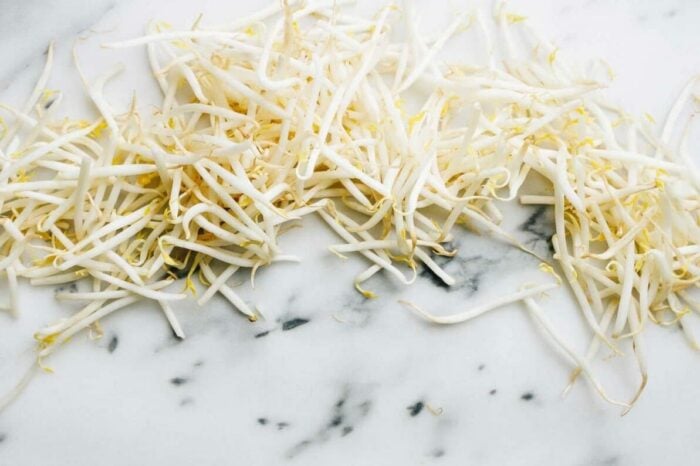
Look for sprouts that are plump, bright white, and crisp — not translucent or soggy. Check the sides and bottom of the bag to make sure they’re not watery. For the best texture and flavor, use them within 1 to 2 days. (Check the recipe card notes for tips on how to shop for the freshest ones.)
Bean sprouts seasoning sauce:
The sprouts are dressed in a simple yet flavorful mix of coconut aminos (or soy sauce with a touch of coconut sugar), toasted sesame oil, scallions, garlic, and toasted sesame seeds.
Tip: Coconut aminos give the sauce natural sweetness and are naturally gluten-free. If using soy sauce, reduce the amount by a third and add some coconut sugar for a balanced flavor.
Mung bean sprouts vs. Soybean sprouts
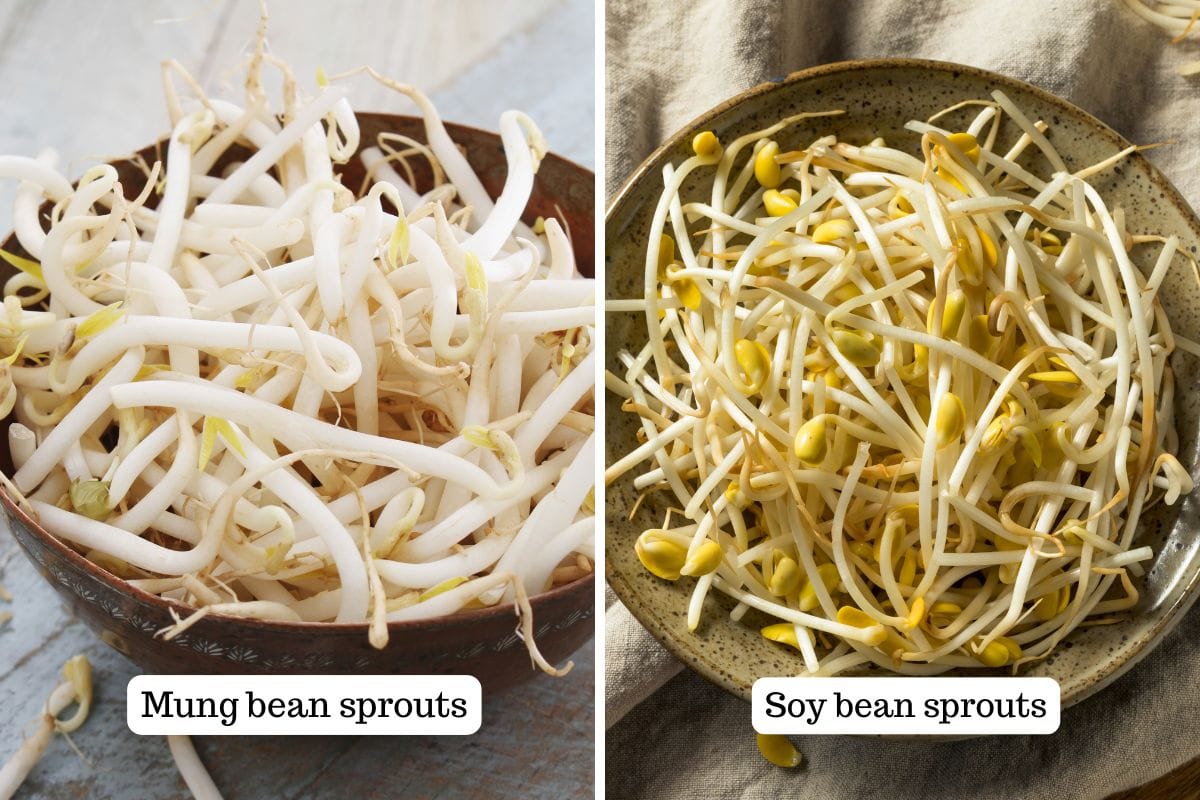
Mung bean sprouts are thin, crisp, and juicy, with tiny yellow heads and a fresh, mild flavor. Soybean sprouts are thicker and chewier, with larger yellow heads and a nuttier taste.
For this bean sprouts salad, I’m using mung bean sprouts. They are quicker to prepare and milder in flavor.
How to make bean sprouts salad
This low-carb mung bean sprouts recipe comes together so quickly! I’ll walk you through how to prep the sprouts for the best texture and blanch them just right. Then we simply toss in the dressing and serve it at room temperature.
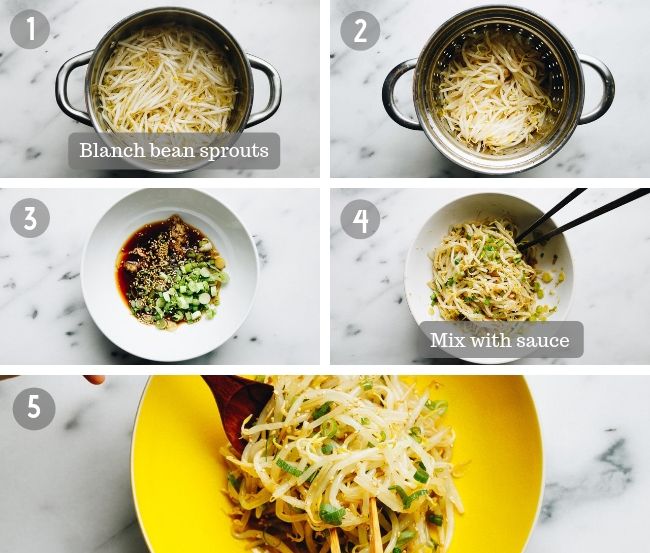
Clean and Trim the Sprouts
- Rinse the sprouts thoroughly in a large bowl or colander, changing the water a few times until it runs clear. Pick out any brown or wilted sprouts and pinch off the stringy tail ends.
- Tip: Trimming the tails makes the salad look cleaner and creates a better texture, but it’s optional.
Quick Blanch & Cold Rinse
- Blanch the sprouts for just 45 seconds to 1 minute. Immediately drain and rinse under cold water. Careful not to blanch too long—overcooked sprouts turn mushy and lose their crunch.
Gently Squeeze Dry
- Use your hands to gently squeeze out excess moisture from the sprouts before adding them to the mixing bowl. This prevents the sauce from getting watery and keeps the texture crisp.
- Tip: Don’t skip the gentle squeezing step! It’ll give you the best texture in the end.
Make the Sauce, Toss, and Serve
- Simply mix to combine—quick and easy!
- Toss the sprouts in the dressing and taste to adjust the flavors. Sprinkle it with toasted sesame seeds. It’s best to dress the salad right before serving at room temperature.
Leftover storage
- Store leftovers in an airtight container in the fridge and eat within 3 days. The sprouts will continue to release water over time so this dish is best served fresh and cold—no reheating needed!
What to serve it with
This Korean bean sprout side dish is perfect for the warmer months or any time you want to add some texture to your meals. Serve it as a side with your favorite protein mains or as part of a Korean banchan (side dish) spread.
- As a side dish: Kalbi (Korean short ribs) is a perfect pairing for this dish! I really love this salad in a spicy tuna bowl or with these teriyaki salmon bites, too.
- More Korean banchan: For a light and easy Korean “tapas” meal, serve with a Korean cucumber salad, vegetarian bibimbap, or this crispy rice bibimbap salad.
FAQs
Don’t overcook them—blanch for just 45 seconds to 1 minute. After rinsing, squeeze out the extra water with your hands before tossing with the sauce.
They’re often used raw in salads, but I recommend blanching them briefly to improve texture and reduce food safety concerns.
More recipes using bean sprouts!
If you enjoyed this popular Korean cold banchan, here are some more tasty bean sprout dishes to try.
Mung bean sprouts recipe (Korean bean sprout salad)

Video
Ingredients
- 1 lb. mung bean sprouts rinsed and pat dry
Mung Bean Sprouts Seasoning:
- 3 tbsp coconut aminos or 1 tbsp light soy sauce + ½ tsp coconut brown sugar
- 2 bulb scallions diced to small rounds
- ¼-½ tsp coarse sea salt or to taste
- 1 tbsp toasted sesame oil
- 0.3 oz. garlic cloves grated (about 1 medium clove)
- Sprinkle Toasted white sesame seeds optional
Instructions
- Clean and prepare bean sprouts: Add the mung bean sprouts to a large colander. Fill with water, rinse, then drain. Repeat this a few times until the water runs clearer.
- Pick out any wilted or brown sprouts and nip away the tip ends. Pat dry with a paper towel to remove excess water.
- Boil water: Bring a large pot (about 7 cups) of water to a boil. Reduce heat to medium, lightly salt the water, and add the bean sprouts. Quickly blanch them for 45 seconds to 1 minute.
- Drain and rinse the sprouts under cold running water. Set aside to drain well.
- Sauce marinade: In a small bowl, combine soy sauce with coconut brown sugar (or use coconut aminos), scallions, salt, sesame oil, and grated garlic. Stir well until the sugar is dissolved.
- Combine: Before adding the blanched sprouts to a large serving bowl, use your hands to gently squeeze them again to remove excess moisture.
- Give the sauce a stir, then pour it over the sprouts. Toss to mix. Taste and adjust the seasoning. Sprinkle with sesame seeds. Serve right away at room temperature or chilled.
- Storage: Store extras in an airtight container in the fridge. The sprouts will continue to release moisture and dilute the sauce, so it’s best to finish within 3 days.
Notes
- How to select mung bean sprouts: Fresh mung bean sprouts should look plump, bright white, and crisp—not wilted, mushy, or watery. If they look translucent, they’re past their prime.
- How to check in grocery stores: Most bean sprouts sold in Western grocery stores come in bags, which makes it tricky to check their quality. I always do a bag check—look at the front, back, and especially the bottom of the bag. If you see a pool of water collecting at the bottom, the sprouts are likely slimy and no longer fresh.
- Best time to buy mung bean sprouts: Buy them only when you’re ready to use them. They spoil quickly, so plan to cook them within a day or two.
- Leftovers: Store leftovers in the fridge and finish within 3 days. Bean sprouts don’t reheat well, so enjoy them cold.
- Food safety: Mung bean sprouts are grown in warm, humid conditions, which makes them more prone to foodborne bacteria. Since they’re often eaten raw or lightly blanched, it’s extra important to use fresh, high-quality sprouts and clean your cutting board and surfaces after prepping.
Nutrition
Nutrition information is automatically calculated, so should only be used as an approximation.
Made a dish and loved it? Please rate the recipe and leave a comment in the section below! It helps my blog grow organically, allowing me to continue sharing free and awesome content with you. Thank you!
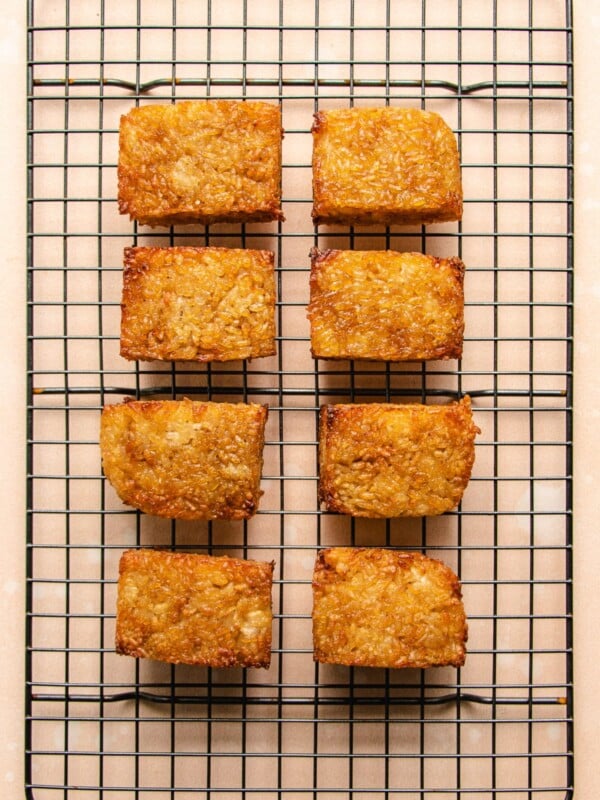
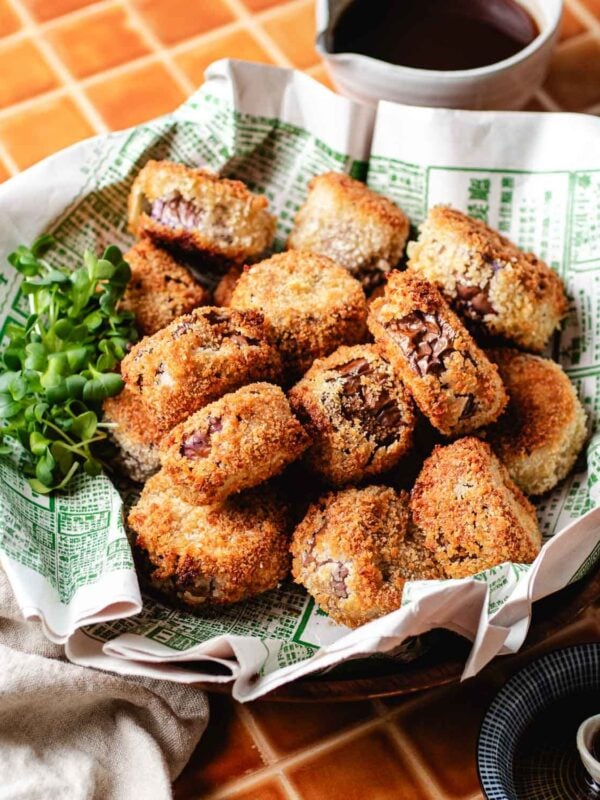
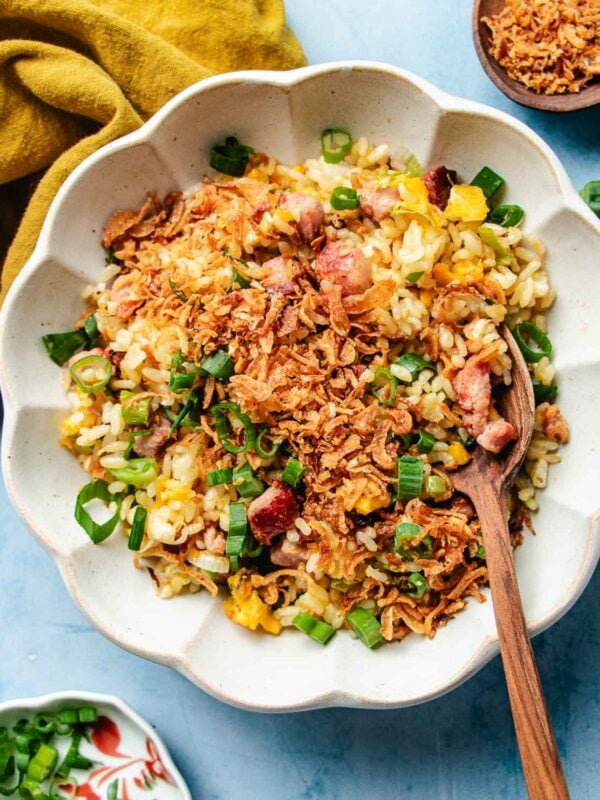
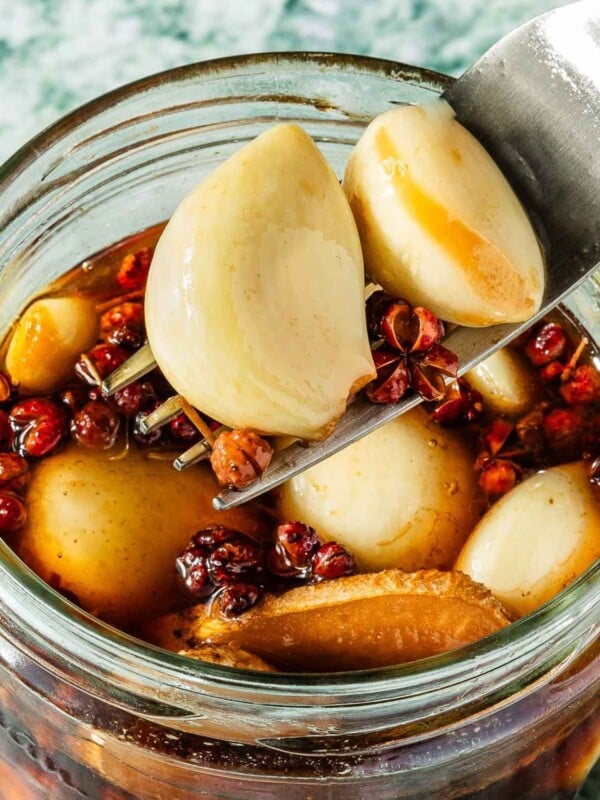
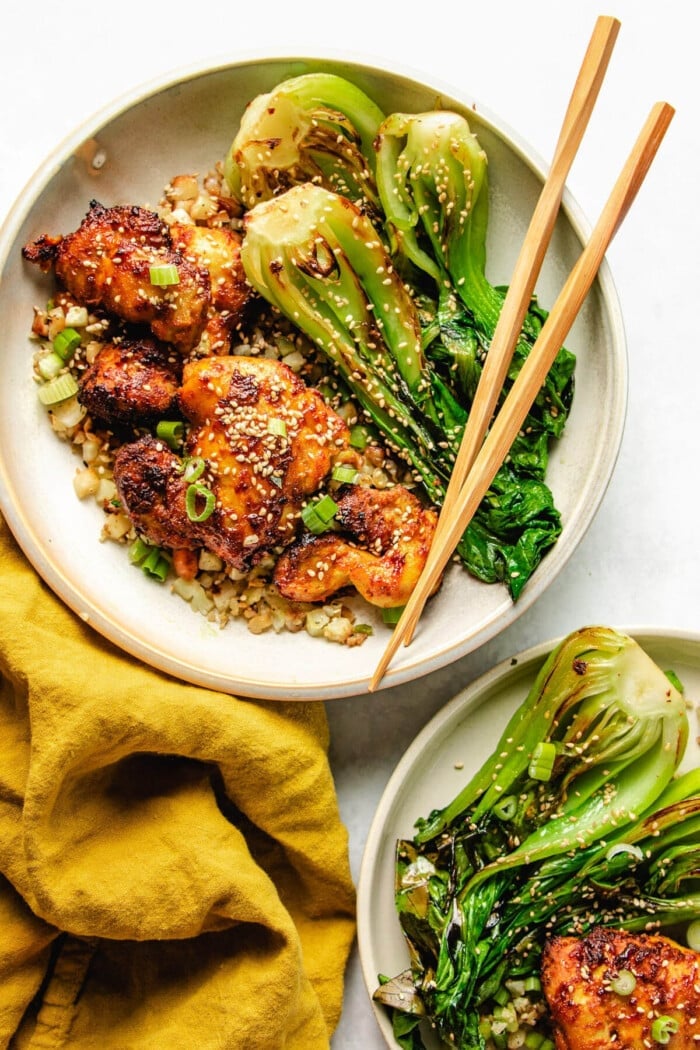








Can you please share how you blanched it using the Anyday in the microwave?
I add just enough room temperature water to cover the bean sprouts and microwave on high for 1 minute. Check and stir and microwave for another 30 seconds. The sprouts should be lightly cooked but still crisp and tender.
I can’t believe how quick this recipe is! Just what I have been looking for! It’s been a while since I wanted to experiment more with bean sprouts, and I think the time has come!
So happy to hear. Lovely!
This is so light and refreshing! Perfect with grilled chicken.
These look so good, and sprouts are so good for you too! A win win.